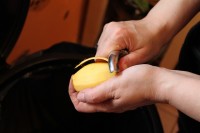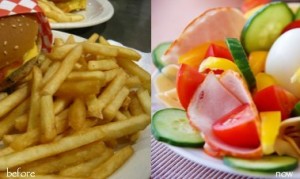How to reduce stress
The first requirement in order to be able to implement a change in your life is that you dedicate time to it. If you want to change your diet you will most probably need to learn to cook differently, attend cooking courses, find new products in the shops, find new, specific shops with quality products, spend more time in the kitchen, eat consciously, learn to know yourself, etc.
Likewise, if there is a lack in some other aspect of your life, you will have to dedicate time to it in order to improve that aspect, may it be spiritual, emotional, physical exercise, contact with nature, etc. It is possible that you will have to work on it on your own or you might go to some kind of therapy. Thus stress and lack of time are the first enemies when it comes to recovering health.
When you can not avoid stress at work, therapy is recommended for stress management. And the question that always arises is: “Where do I get the time to go to therapy, if I have no time?”
Maybe you can start by some very simple exercises that do not require much time and can be done at home easily: techniques based on breathing, listening to relaxing music, reading, taking a salt bath, ...
Later, you will surely find the time to practise yoga, pilates, go to meditation classes, etc.
By practising some of these activities you can "kill several birds with one stone":
* Cooking: nutrition, exercise (yes, it counts!), saving money.
* Outdoor activities (walking, hiking, biking, swimming, ...): sun exposure, exercise, contact with nature, stress management. Instead of going to the cinema or watching TV at the weekend, you’d better get out!
* Listening to a "podcast", a "youtube" video or lectures while getting around: you can learn about nutrition, psychology, health, education or any topic of your interest.
 * Buying food at traditional markets rather than supermarkets, or better yet, buying directly from the farm. This way you can improve the quality of your food, walk outside, do exercise, build social relationships, get into contact with nature, be ecological and save money.
* Buying food at traditional markets rather than supermarkets, or better yet, buying directly from the farm. This way you can improve the quality of your food, walk outside, do exercise, build social relationships, get into contact with nature, be ecological and save money.
* Attending Eucharistic celebrations (if you are a believer) and/or volunteer in a organization: spiritual growth, social relationships, stress management.
Other ideas:
* You can reduce the time you spend on social media. When you do not have much time, it is better to have fewer encounters with real friends in real life than to spend many hours following online acquaintances or friends of friends of friends ... And it is even better if you do some beneficial activity when meeting your friends; such as walking, cooking, going to a course or therapy together, etc. Friends are often the best psychologists! Before social networks existed, people used to talk to neighbors and their good friends or family members about their problems.
* Reduce your children’s extracurricular activities in which you have to play the role of the taxi driver and spend that time and money on improving your children’s nutrition. It’s probable that you want the children to develop their abilities and skills to the fullest. However, it can sometimes turn out to be stressful, both for them and for the parents. Children also need some free time to play quietly. Spending some time at home after school and after work is necessary for the child to relax and for parents to be able to prepare a nutritious dinner.
Reduce your children’s extracurricular activities in which you have to play the role of the taxi driver and spend that time and money on improving your children’s nutrition. It’s probable that you want the children to develop their abilities and skills to the fullest. However, it can sometimes turn out to be stressful, both for them and for the parents. Children also need some free time to play quietly. Spending some time at home after school and after work is necessary for the child to relax and for parents to be able to prepare a nutritious dinner.
* Prioritize the most important things. Think about what really matters in life. Surely many things can wait, and it doesn’t really matter if some things are not done. For example, it can be bearable for some time to have your home a little untidier, just until your health has recovered a bit, and devote the gained time to better nutrition.
How to overcome food addictions
Changing a diet when one has addictions can be extremely difficult as in some cases addiction to certain foods, such as sugar can be stronger than addiction to cocaine.
Some ideas that might help you overcome food addictions:
* Go slowly decreasing quantities, replace some products with others that have a similar taste: replace sugar with honey, chocolate with carob, coffee with decaf coffee first and with chicory later on, cow’s milk with non-dairy milk, etc.
 * Ask for the help of a person in your family. In the case of children it is the parents who are going to prevent them from eating food which they are addicted to.
* Ask for the help of a person in your family. In the case of children it is the parents who are going to prevent them from eating food which they are addicted to.
* Energy therapies: Reiki, cellular therapy
* Personal development therapies: psychotherapy, coaching, hypnosis, PNL, ...
* Spiritual therapies: they give you the inner strength to greater willingness!
How to change children’s diet
All people are resistant to change, especially children, and even more if they have some kind of psychological or neurological problem.
Dr. Campbell-McBride proposes an authoritarian approach, where children are forced to eat what is best for them. You should try to keep the child at the table until he/she has tried a little bit of the healthy food which you wish to introduce in their diet. Once you have achieved the goal, you should praise the child in some way: hugs, some kind of reward (not food), etc. You should keep firm and determined as many hours as necessary, if needed, throughout the day, or an entire weekend. It is an extreme method, but it does work.
 Another more gentle method proposed by Julie Mathews is to try to make healthy food more attractive to children: by preparing crunchy vegetables and hiding them mixed into other dishes, introducing new foods preferably at snack time, making healthy dishes as appetizing as possible, and most of all having the hope that in the end, after eliminating all foods which the child is addicted to, he/she will start to like the new healthy food.
Another more gentle method proposed by Julie Mathews is to try to make healthy food more attractive to children: by preparing crunchy vegetables and hiding them mixed into other dishes, introducing new foods preferably at snack time, making healthy dishes as appetizing as possible, and most of all having the hope that in the end, after eliminating all foods which the child is addicted to, he/she will start to like the new healthy food.
Another idea is involving children in food preparation. They will love to make art creations with vegetables and fruits! Here you can find some ideas about how to make children eat vegetables.
It is very important to make the child realize the relationship between food and health. So, when a child becomes ill, think about what food could have caused the disease and explain it to the child, too. Maybe he hasn’t resisted to accept a cookie from his friend at school… At the beginning it’s normal that he cheats sometimes at school, but then, it’s important that he realizes that then he feels worse.
Thus it is sometimes necessary to start a somewhat healthier diet for a while, so that the child gets better, and both parents and the child realize the previous worsening in health, and they can relate it to a detrimental food. This method has worked very well with my daughters!
Family support
It is a tough experience when we can’t eat many of the things we could eat before. Besides having to overcome an addiction or a simple intolerance to certain foods, there is an inequality we need to experience when we observe people who surround us eating food which is forbidden for us. For example, for children the fact of seeing other children eating those delicious and unhealthy snacks is a temptation that is really hard to overcome. In addition, they have to reject the other children’s offers.
It is an ordeal that these children have to suffer, a test that will strengthen their character. Learning to say "no" will help them to be able to say "no" to other important things later in life, such as drugs, alcohol and tobacco.
 But at least the family can make an effort so that the child does not feel too left out, not having those horrible temptations to go and search for food secretly and he/she can feel equal to others, at least at home.
But at least the family can make an effort so that the child does not feel too left out, not having those horrible temptations to go and search for food secretly and he/she can feel equal to others, at least at home.
In any case, adult or child, I think it is positive if there is family solidarity at home. All family is going to win in health! At work or school, out of home, the other members of the family can still eat the same way as before.
Other obstacles
You may find other obstacles when changing your or your children’s diet. This topic is usually controversial within a family and the parents may not always agree about the diet their son or daughter should follow. In this sense, medical analysis and scientific research studies of prestigious journals can often help to convince couples who do not favor alternative medicine and nutrition.
In other cases, there are no financial means to spend on a healthy diet, but you can find cheaper alternatives to follow a proper nutrition:
1.- Decrease the amount of food and increase quality.
2.- If you invest in nutrition, you prevent diseases and consequently you save money on medicine and doctors.

4.- Organic food contains more nutrients, thereby decreasing the need for complementation. In most cases you don’t need to spend much money on supplements because when you follow a proper diet, the nutrient absorption is better and there is no lack of vitamins, minerals or other nutrients.
Another common obstacle is when there are other priorities, such as one’s career, social life, travelling, going to restaurants, etc. Following a healthy diet means eating home-made food, so the food should be prepared at home and if necessary, you can take it to work, school, etc. Depending on your case you may consider going off the diet from time to time if you can tolerate it, or simply running the risk of eating something that is not allowed as it could be hidden in a dish of a restaurant, for example, contamination of gluten due to the reuse of the frying oil for food in batter.
But the most common cause of failure in the implementation of a nutritional treatment is the lack of conviction in the fact that it will work, that the sacrifices will be worth it. Although there is always a scientific explanation behind every nutritional therapy, unfortunately there is not enough research in the field of nutrition to ensure results by following a diet. Most diets only collect testimonies of numerous cases in which the recovery of health has been successful.
Lack of perseverance is also a problem when someone follows a nutritional treatment. We are accustomed to conventional medicine to alleviate the symptoms of a disease quickly. However, nutrition is a long-term treatment, where recovery is usually very slow and it is often difficult to realize a bit of progress. Moreover, the improvement is very irregular and due to the first phase of detoxification there is always worsening when someone starts a treatment, which discourages many people.
Unfortunately, because of all these obstacles, we often do not prioritize health and we do not take nutritional treatment seriously until our health is in a gravely insecure situation. And the longer you wait, the worse your condition is, the harder it is to recover.
 In
In 









 Gemma Calzada es doctora en Salud Holística y terapeuta GAPS. Su objetivo es mejorar la salud con la nutrición y el estilo de vida, y ayudar a las personas que sufren intolerancias alimentarias a vivir felices.
Gemma Calzada es doctora en Salud Holística y terapeuta GAPS. Su objetivo es mejorar la salud con la nutrición y el estilo de vida, y ayudar a las personas que sufren intolerancias alimentarias a vivir felices. 
